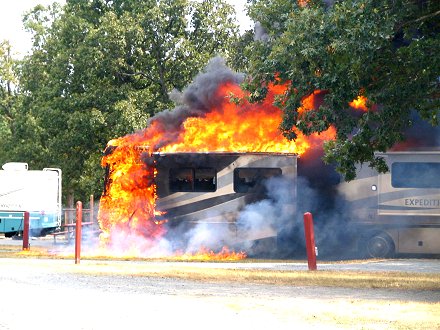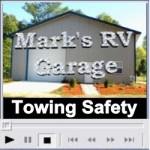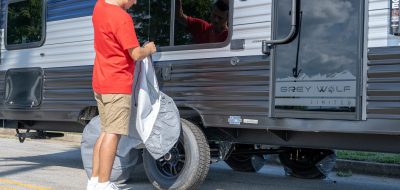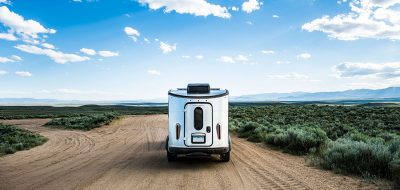
With camping season nearly underway I’d like to make a quick run over RV Fire Safety. During my 33 year career as a fire captain and fire/arson investigator I responded to and investigated many RV fires. One thing about RV fires everyone must know, no matter the cause they go up FAST. This is due to a few reasons. One being the lightweight materials used in construction, another being they “vent” very quickly meaning the fire breaches the outside quickly and fresh oxygen is introduced to the fire. I’ve responded to many RV fires on the freeway within a mile or two of my station and almost all were fully involved by our arrival in just a few very short minutes.
There are some very inherent dangers in RV fires. The smoke generated by the fires is extremely toxic in nature, more so than other fires again due to materials used for construction and contents and other items you might have stored in places like the basement or compartments. Should a fire of any size at all occur and cannot be controlled within the first couple of minutes with an extinguisher you the RV’er should get out and get as far away from the RV as possible. The reason for this is when propane tanks become impinged and heated by the flames it can cause a BLEVE (Boiling Liquid Expanding Vapor Explosion). What happens is the tank explodes and becomes a projectile which can be hurled up to 2,000’! I’ve been on many BLEVE’s and it’s enough to take 10 years off your life IF it doesn’t kill you. While the average citizen doesn’t ever see anything like this firefighters do quite often. It’s an inherent danger of the job.
One of the very first things we’d do on arrival was try and determine the location of the LPG tank(s) and immediately cool that area first in an attempt to avoid a BLEVE, many times done with hose lines from a distance.
Should you be woke up by a fire at night in your RV it is usually a sign the fire has had a bit of time to progress as if you were already awake. The best thing to do at this point is get out by any means possible and get away from the RV. I could tell you some real horror stories about some of these fires, but instead I will go into means of prevention and maintenance to avoid them instead. Yes I have responded to some with fatalities involved so the best type of RV fire to have is none at all!
* Fire extinguishers…. You should have more than one, ideally one in the living area and another in the sleeping area. If you are awakened by a fire at night the extinguisher in the living area may not be accessible and you may need one to assist in your egress. Class A or class A, B, C extinguishers are best as they are designed for things like wood, cloth and normal materials with the exception of the Class C for electrical. Some extinguishers like Halon and similar products can be a danger as they are designed to eliminate the oxygen in an “enclosed areas” thus assisting in putting the fire out by robbing it of O2. Not a situation you want to be in if avoidable. Those are best for confined spaces such as engine compartments, storage areas and such, not open living areas. Extinguishers change often with types and contents so go by your local fire station and ask the crew which would be best in your scenario. Again if the fire cannot be contained within a minute or maybe two it isn’t going to be and you need to get out! An RV can be replaced, You can’t!
* Smoke alarms… Replace the battery every year! Test them often and don’t wait for the test to fail before you replace the battery! They really do save lives! At one rally I attended and put on a seminar I checked a gentleman’s smoke detector and it didn’t work much to his surprise. The reason was the battery (brand new) still had the no connect tab between the connections for shipment! Believe it or not if the alarm doesn’t wake you up it’ll most likely be too late or the smoke will have already gotten to you. Smoke rises so the detectors go off in the very early stage of the fire.
* Maintenance comes into play as well and is just as important. Make sure all your appliances are in good condition and proper working order. One example is the exterior area where the vent for your water heater is located. Look for black soot on the outside and inside of this compartment. This is indicative of improper combustion and many fires I investigated were caused by improperly maintained water heaters. I’ve also investigated many fires that were caused by overheated wheel bearings because of lack of or no maintenance at all. Ever wonder why a 20 year old fire truck looked and ran like brand new? It’s called preventive maintenance. Inspect your RV annually or have a qualified tech do so. Be safe! I’ve been sincerely shocked at how many people just drive and camp and do no maintenance at all and the things I’ve seen!
*… Emergency Exits… Know how they work! You’d be surprised at how many don’t. I’ve put on many seminars and it scared me to death when I asked someone to show me how theirs worked and they did not know! If you don’t open them now and then they can be come corroded and difficult to open, not something you want to encounter during an emergency. Some RV’s like mine have a long drop from the bedroom window emergency exit, but think about it. I’d rather suffer a possible broken bone rather than die in a fire! They make small ladders now with “hooks” that fold out and can be hung in the window sills to make it easier to egress during an emergency. As you can see by the picture in the article age is not always the common denominator in RV fires. Very few of the fires I investigated were accident relate, but more human caused and/or a lack of maintenance issue.
The age old question of fueling with fridges running etc comes up all the time. I see no problem traveling with the propane on however everything should be turned ofgf when fueling. I responded to and investigated a fatal fire once where in fact the fire was caused by gasoline fumes that found there way in an ignition source (fridge) and it was a horrible fire. the man perished in front of his wife, kids and us as we rolled in. I will not argue this with anyone as I was there. Probably a one in a million chance, but I’m not rolling the dice. I’ve seen what can happen where most civilians haven’t.
I’m sure most of you have heard how oily rags kept in containers or piled up have caused a fire through spontaneous combustion, much like a haystack or silage piles. don’t store used old oily rags in your RV or even in the basement/compartment. This is a very common cause of fires. Discard the old oily rags when done.
In addition follow the same simple rules you would in a conventional home regarding candles, smoking and things like that. One reason I am such an avid user and promoter of RV Notebook software is it can remind you of all these things once you put them in. We all forget at times. It can be used for all maintenance things to include servicing fire extinguishers, changing the detector batteries which all should also be done annually and everything thing else in between. Even with all my experience and knowledge I can forget too. This is why it’s all put in my RV Notebook software program to insure it ALL gets done. Be safe and do it right. Have a safe and enjoyable upcoming camping season!
Tony (aka Firedude)








Pingback: ניסור בטון
Pingback: Visit Site
Bill
Hey Firedude, Just wanted to let you know of a possible fire cause on a 1990 Bounder, the main wiring harness hangs over the left front wheel, it is held in place with only cheap plastic wire ties, they become brittle and fail, leaving the harness to drop down and rub on the front wheel, exposing hot wires to the chasis, you know the rest of the story ! I figured you may know who to contact so that others may be warned of possible fire or worse…….THANKS……. Bill
Pingback: RV fire- do you know what to do?
Mike
Great article thanks for the information.
Tony Cornett
Patrick…
Great post and thank you!:) yes everyone should have an extinguisher of some sorts with them at all times!
As far as fire extinguishers folks they are “rated” for the different types of fires.
* Class A extinguishers are for ordinary combustible materials such as paper, wood, cardboard, and most plastics. The numerical rating on these types of extinguishers indicates the amount of water it holds and the amount of fire it can extinguish.
* Class B fires involve flammable or combustible liquids such as gasoline, kerosene, grease and oil. The numerical rating for class B extinguishers indicates the approximate number of square feet of fire it can extinguish.
* Class C fires involve electrical equipment, such as appliances, wiring, circuit breakers and outlets. Never use water to extinguish class C fires – the risk of electrical shock is far too great! Class C extinguishers do not have a numerical rating. The C classification means the extinguishing agent is non-conductive.
* Class D fire extinguishers are commonly found in a chemical laboratory. They are for fires that involve combustible metals, such as magnesium, titanium, potassium and sodium. These types of extinguishers also have no numerical rating, nor are they given a multi-purpose rating – they are designed for class D fires only.
Of these different types there are many different type of extinguishing agents. They all come in varying sizes.Some come rated for multiple types listed above as well. Since I’ve been retired a few years now my suggestion to you in to contact your local fire department for advice on the type AND size you might need. They’ll be glad to assist you. I’d prefer everyone have up to date info on the extinguishers out there and available. Just please, please remember these are All for fires in the incipient stage. don’t expect to to fight a larger fire with a “garden hose”. It just doesn’t work. You safety is above all.
I taught fire extinguisher use and maintenance in the industrial world and I always emphasized the fact they are for fires that have just started. beyond that you need the big red extinguishers on wheels (fire trucks). 😉 Even the larger industrial types are NOT meant to fight and extinguish larger fires. They are an immediate need item for incipient stage fires only.
Tony
http://thefiredude.com
Tony Cornett
Alpenliter…….
I have read about the Tundra, but have no experience with them. One thing I’d like to get across to everyone is all your small extinguishers of any kind are for SMALL fires, ones that have just erupted/started. Once the fire advances much beyond that it’s time to get out and away from your RV! Trust me on that one. as your small extinguisher will do practically nothing for you. Don’t get a false sense of security over these small extinguisher. They were not designed to fight large fires period. they are all designed to fight small fires in their incipient stage. Unfortunately I have not field tested the Tundra, but imagine no matter it’s discharge distance it will be more effective in extinguishing than any other small extinguisher. Alpenliter I wish I had a better answer for ya. Maybe someone who has field tested one will chime in. Like I said if you are asleep, even with a smoke detector, by the time you are awake and able to do anything most small hand held extinguishers will NOT do the job as the fire has gone well beyond the incipient stage. It’s time to get out by any means possible. The only thing it may do is help protect you to some degree until you can get out. Take that from a life long firefighter and fire/arson investigator.
Tony
http://www.thefiredude.com
Patrick W. Tribbey
GREAT article, “Firedude”! SAFETY is paramount in all circumstances! Perhaps the RV manuf.’ers will eventually integrate more fire retardent materials into their units. Sure hope so! I do remember in the many times I had to attend U.S. Navy FF school they taught us this: 1. Scream “FIRE!” at the top of our lungs; 2. Start fighting the fire the best you can; 3. Let the FF teams takeover A.S.A.P. Now, think about this, too: You’re on board a U.S. Navy ship 1,000 miles at sea. You can bet your last dollar that the sailors will do EVERYTHING to save the ship—–that’s their ride home! ! ! 🙂 I realize those fires are somewhat different, but most of the basic principles remain the same.
Would you mind posting a list of suggested fire extinguishers? Reason I ask, I had an alternator fire. No extinguisher! Eventually got it out. Had to sit and wait for 1 1/2 hrs. for tow truck. A Highway Patrol pulled up and asked if needed any help. Told him “Thanks! Have a tow truck on the way!” I could hear his two-way and dispatch was telling him my name, rank, horsepower, and Lord only know what else! 🙂 Picked up a small F.E. for the p/u from “Wally World”.
I encourage EVERYONE to carry a F.E. in their sedan, SUV’s, trucks of all types! You may never know when you may save someone’s life, or even your own! ! SAFETY can NOT be emphasized enough!
Have a good day today and a better one tomorrow! 🙂
Alpenliter
Tony, are the “Tundra” brand fire extinguishers put out by First Alert worth a darn? They advertise that they spray 4 times longer than a traditional throwaway. I keep one next to my bed so I don’t wake up dead.
dave beach
excellent article; hope others read it all thru also. tHANKS for the refresher. Our smoke detectors work every time I cook anything “smoky” on the range top, indirectly testing them (near kitchen and back in bedroom…)
Bill Daines
Very good article, Prior to my retirement I was assigned to a township and most of the time on a vehicle fire, I was the first to arrive. The fire extinguisher in my cruiser either extinguished or simply prevented the fire from spreading. In some instances the fire extinguisher was not enough to extinguish the fire, however I believe every vehicle should have one. If you do not, you should go out and purchase one. All motor vehicles and RV’s should be equiped with an extinguisher and should be checked regularly. Thanks, Bill D
Tony Cornett
Judy and Tom, thanks for the notes!
Tom, unfortunately most fire equipment companies only deal with commercial grade extinguishers. Most non commercial types are what I call throwaways. Use them once, buy another. Check around though as you can most likely find some decent smaller commercial grade extinguishers for just a bit more. that way you aren’t as you put it “left staring at the pressure gauge to make sure it is in the “green”. I’ve never trusted the cheap small extinguishers like that. I’ve seen many in the green that didn’t work. check around I’m sure you can find a good small commercial grade ext. someplace. You don’t need something big as I stated if a fire gets that big an extinguisher isn’t going to do the job. In RV’s an extinguisher is for small fires that have just occurred.
Tom Hargreaves
Very good post, Tony, maybe even all the way to “great” post!
Speaking of fire extinguishers, do you have any pointers on maintaining these things? I was most surprised when I called a fire extinguisher place to get my dozen or so extinguishers inspected (some quite old) and they told me they didn’t do that for the cheap kind with the black plastic heads because they’ve had too many problems doing a pressure test. Does this mean that we “civilians” are limited to staring at the pressure gauge to make sure it is in the “green”?
Thanks,
Tom
Judy
As always, thanks for reminders and experience. I just took my 5th in today to have them go all through it and make sure it was safe and perform all the maintenance needed to be ready for the upcoming season..